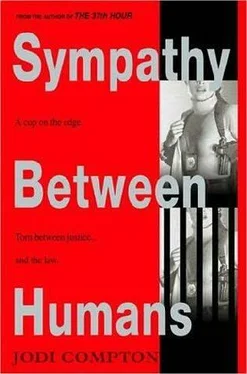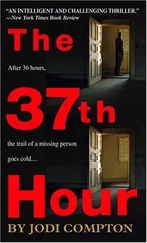“She was obviously troubled, but to me it seemed that something in her was struggling to survive, suicidal ideation or not. I was hopeful about her case, but after I got her a bed in the psych ward, I didn’t hear anything about her again.
“She never forgot me, though. One night, about six months later, she left me three phone messages at the ER. I called her and found out that she was in crisis again. Her husband, who’d been a needle user, had told her he was HIV positive and didn’t think he could support her or the kids anymore, then took some cash and the car and left. She hadn’t heard from him in two days. She couldn’t come in to the ER, because she had no car and no one to watch her babies, but she badly needed someone to talk to, in person, not over a crisis line. She asked if I could come over.”
Cicero rubbed his temple, remembering. “I can remember to the minute how long I had before I got off work. Forty-two minutes; there was a digital clock hanging in the corner. I looked at it and told her I’d be there soon.”
It wasn’t right that I was feeling angry at this woman. My anger should have been focused on Cicero. I could see how he must have appeared to her: tall, competent, caring, handsome, and sworn to first do no harm. But instead I felt a spark of anger at the unknown, needy, grasping woman who I knew was about to drag Cicero into a trap that would cost him his job, his license, and eventually his legs.
“On the way over,” Cicero went on, “I’d been thinking about what I would tell her: that she had to get tested for HIV, places where she could get help taking care of her children. But she didn’t want to talk about her problems when I got there. She was composed, making tea in her kitchen in this long white nightgown. She didn’t seem crazy, and she didn’t seem suicidal. If she had, everything would have gone differently.”
I felt a little chill when Cicero said the word suicidal, realizing where this story might be going.
“She told me about her childhood, ballet, and England. In the middle of this reminiscing, she said it was ironic that she’d married her husband in order to stay in America after her visa expired. Now all she wanted was to be in London again, and she was afraid that was never going to happen. She said she felt like her life was over at age 22.”
The building’s air-conditioning kicked in, noisy in the silence between his words.
“It seemed very, very natural,” Cicero said, “to put my arms around her and hold her.”
He said no more, bringing the curtain down on the first act of a two-act story.
“She could have been HIV positive,” I reminded him, as if the danger hadn’t long passed, one way or another.
“I knew that,” Cicero said. “Did you ever read Hamlet ?”
“Once,” I said.
“Did you notice the oddly sexual imagery in Ophelia’s burial, how the queen compares a bridal bed to a grave?”
“What are you saying?”
“That sometimes proximity to death can be erotic. She was Ophelia to me. I wanted to lie down in her grave and bring her back to life.”
“So I was right the first time,” I said. “It was compassion.”
“If you can be compassionate and selfish at the same time,” Cicero said. “If she needed to feel alive, I needed that, too. In those days, sometimes I’d leave work so numb from what I’d been doing all night that I felt like a walking dead man. That was before I realized how lucky I was just to be walking.” He said this very simply, without self-pity. “I was 34 then. I told myself the same lie a lot of ER staff tell themselves: I didn’t have time for a relationship, that no woman would tolerate the crazy hours or understand the stress I was under. Other women in the ER did, and I hooked up with a few of them, but those were just friendly trysts. Relief sex, we called it sometimes. And I had some one-night stands with women I met in bars. Underneath it all, I was probably pretty goddamned lonely, although I couldn’t have seen it back then.”
I was sitting on the floor; now I slid closer to him so that I could take his hand. Cicero let me, but he said, “Don’t feel sorry for me. I deserved everything that happened next. Her sister came over from Manchester and helped her file a lawsuit against the hospital. In the hearings, a lot of things came out that I hadn’t known. Since her suicide attempt, this woman had been seeing a psychiatrist, and had been diagnosed with borderline personality disorder. She had a terrible time with men, couldn’t trust them, but at the same time had been known to fixate on men she barely knew, as potential lovers and saviors. She’d been transferred to a female psychiatrist after transference had caused problems with a male therapist.”
“You didn’t know any of that,” I said.
Cicero ’s expression told me I should have known better. “The mentally ill cannot be expected to identify themselves as ill.”
“I just meant, it seems like an awfully harsh punishment for what you did.”
“ ‘Into whatever houses I enter, I will go into them for the benefit of the sick,’ ” Cicero said. “It’s part of the Oath.”
I looked down into my empty coffee cup. “Is it guilt, then, that makes you keep seeing patients under these circumstances?” I indicated the small and underequipped exam room that lay beyond his bedroom door.
Cicero considered that. “Not really,” he said. “It’s selfishness, almost. You know how some dogs- herding dogs, rescue dogs- are bred to work? Even when they’re raised as house pets, they wake up in the morning and look at a human to say, How can I help? It’s bred into them. Some people are that way, too. I have to do what I’m trained for. I’m a working breed.” He lifted a shoulder in something that wasn’t quite a shrug. “I can’t change now. I am what I am.”
***
I caughtthe last bus home, sometime after midnight. As I got on, a young woman got off at the back exit. Just as she did, our eyes met. Ghislaine, for once without Shadrick, eyed me quite curiously for a long moment before she dropped down the back steps and through the doors.
It’s a detective’s prerogativeto use a car from the motor pool, and it didn’t raise any eyebrows at work when I began using one. If word had spread that the BCA had my car for testing, no one referred to it, even implicitly, in my presence. Meanwhile, I used the motor pool car not only for work but to drive out in the evenings and visit the Hennessys.
Kids adapt to the whims and dictates of adults the way the rest of us adapt to changes in the weather. The Hennessy boys accepted my new role in their lives with a shrug. I checked the details that Lorraine had mentioned; it was clear that the laundry was getting done, and the house was as clean as anyone could reasonably expect with four young people living in it. The Hennessy home wasn’t meant to look aseptically neat, anyway; that was part of its charm. It was an old house, and everywhere were testaments that this was a longtime family home. There were nicks in the shabby-elegant pine furniture, and along an upstairs hallway, there were dots and dashes of bleach, a Morse-code tale of someone’s haphazard attempt to scrub out stains. From the length of the pattern, I didn’t think it was Kool-Aid. Blood, maybe, from a nosebleed or some childhood mishap.
But on a day-to-day basis, the kids kept the house fairly tidy. It was soon plain to me that these kids had been self-directed from an early age; Hugh hadn’t been a micromanager as a parent for a long time, perhaps never. Other kids might have fallen apart after what had happened to Hugh; the Hennessy kids had taken the reins of their lives also automatically.
Читать дальше












